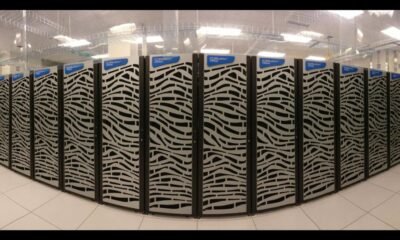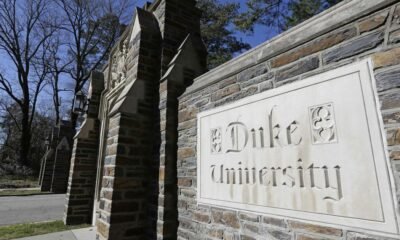AI Insights
A billion-dollar bet on artificial intelligence is about to hit reality
Microsoft cut 15,000 jobs this year while investing US$80-billion on machinery that powers AI.Dado Ruvic/Reuters
In 2023, ChatGPT burst onto the scene, marking a new era for artificial intelligence and fuelling expectations that AI would reinvent everything. Proponents enthused it would lift global GDP by trillions, create entirely new industries and transform how we work. CEOs promised it. Politicians echoed it. Analysts modelled it into their long-range forecasts.
But a different story is emerging: Amazon, Google, Meta, Intel and Cisco are all announcing deep layoffs. These aren’t cyclical trims. They’re a reallocation of capital. Human labour is being cut to fund machine infrastructure. Microsoft cut 15,000 jobs this year while doubling down on AI, investing eye-popping amounts. And they’re doing it despite growing investor unease about whether this massive spending will actually pay off.
That’s not hyperbole. Microsoft is investing US$80-billion this year on what the tech world calls “compute” – a term that includes GPUs, data centres, cloud platforms and the electricity to power them. Capital is moving from people to the physical machinery that makes AI run.
The underlying bet is that machines will eventually deliver what humans can’t: scale, speed and 24/7 output. But that future still hasn’t arrived, and in many cases, may never look like the version we are being sold today.
Is AI helping workers and improving productivity or just creating more work?
Right now, AI largely means large language models (LLMs): ChatGPT, Claude, Gemini and others. These tools generate remarkably fluent responses and can sound almost human. But here’s the thing: They’re not actually thinking. They’re not reasoning. They don’t understand the words they’re using.
LLMs work through pattern prediction. They are, in effect, highly advanced autocomplete engines predicting the next most likely word in a sentence based on what they’ve seen in their training data. That’s it. The illusion of intelligence is compelling, but it’s just that: an illusion.
Apple’s AI research team recently made this point in a paper warning that LLMs give users the illusion of thought. The models appear intelligent because they’ve learned to mimic the way humans speak. But there’s no internal model of logic or truth – just statistical guesses that sound right. Users supply the meaning; the machine doesn’t have one. After all, just because a parrot can mimic your words doesn’t mean it understands them.
And yet, on the back of this illusion, companies are making some of the biggest capital allocation decisions in a generation.
Recent funding rounds valued OpenAI as high as US$300-billion. A US$12-billion to US$13-billion revenue projection for 2025, tripling year over year, means investors assign it a revenue multiple as high as 25 times. For context, Cisco traded at a similar multiple during the dot-com peak – before losing more than 75 per cent of its value in the crash that followed.
Is today’s AI boom bigger than the dotcom bubble?
OpenAI’s own forecast calls for revenue to reach US$125-billion by 2029, which would compress its multiple dramatically. But that kind of 10-times revenue growth in just four years would be unprecedented – even among the giants. Major tech firms like Apple, Google, Amazon and Microsoft – highly profitable and market-dominant – typically grow revenue by two to four times over four-year periods once they reach scale. None of them has pulled off a 10-times leap at that stage. If OpenAI does it, it will be the exception that proves a very high-risk rule.
And, unlike those giants, OpenAI isn’t diversified across product lines or industries. It has one core product and a cost structure that scales with usage. Margins are still a moving target. Meanwhile, rivals like Anthropic, xAI, DeepMind and fast-moving open-source players are gaining ground. China’s DeepSeek recently released a model that claims to match GPT-4’s performance at a fraction of the cost. That raises a bigger question: How defensible are the market share, margins and valuations OpenAI is currently commanding?
User results on the ground remain mixed. More than 80 per cent of businesses using AI technology are not yet seeing significant earnings gains, according to a new report by McKinsey & Company published in June. Most deployments are pilots or prototypes. Gartner estimates only 30 per cent make it past testing. RAND puts the failure rate closer to 80 per cent.
Still, the spending keeps rising. Over the next few years, the sector is expected to invest more than US$1-trillion in AI infrastructure. Microsoft, Amazon and Google are racing to build, on the assumption that once it’s in place, the payoff will come.
In the AI revolution, universities are up against the wall
That payoff, however, continues to underwhelm. MIT economist and Nobel Laureate Daron Acemoglu estimates AI may lift U.S. GDP by just 1.1 per cent to 1.6 per cent over a decade, translating to annual productivity gains of 0.05 per cent. Helpful, yes. But nowhere near the level implied by current valuations.
The often-cited PwC report that says AI could add US$15.7-trillion to global GDP by 2030 includes both productivity gains and new consumer demand. But that number assumes smooth deployment across industries, rapid scaling and minimal resistance. The reality has been slower and far more complex.
Long Island Iced Tea’s stock price rose by 432 per cent after the company announced its name change to “Long Blockchain Corp.,” despite not launching any blockchain product. Similarly, Meta’s $60-billion investment in the metaverse offers a cautionary tale. The rebrand, the restructuring, the wave of corporate FOMO – it all led to a platform that most people simply didn’t want. Virtual reality headset sales peaked briefly in 2021–22, then slumped. The company quietly walked back its vision and pushed hard into the next hype cycle – AI.
AI is not a gimmick. But it’s also not magic. It’s an impressive tool being asked to carry an entire economic transformation before it’s ready. Most of the real value, when it does come, will likely come from narrow tools that complement – not replace – human capability.
Sam Sivarajan is a keynote speaker, independent wealth management consultant and author of three books on investing and decision-making. His forthcoming book will explore how to thrive in a world of uncertainty.
AI Insights
Artificial Intelligence Consultant Ashley Gross Shares Details on Pittsboro Commissioner Candidacy

Among the eight candidates looking to connect with voters in Pittsboro this fall is Ashley Gross, an artificial intelligence advocate, consultant and course creator.
Gross filed to run for the town government’s Board of Commissioners in July, joining a crowded race to replace the outgoing Pamela Baldwin and James Vose. A resident of the Vineyards neighborhood of Chatham Park, she works as a keynote speaker and consultant for businesses looking to learn more about AI practices in the emerging technology space, leading her own consulting company and working as the CEO of the organization AI Workforce Alliance.
In an email with Chapelboro, Gross described herself as “a mom who loves this little corner of the world we call home” and committed to the area. When describing her motivation to run — in which she incorrectly stated she was running for a county commissioner seat — she said helping the greater Pittsboro community feel connected and supported with a variety of resources is key amid the town’s ongoing growth.
“I see the push and pull between people who have called Chatham home for generations and those who are just discovering it,” Gross said. “I believe that our differences are not barriers. They are opportunities to learn from each other. My strength is sitting down with people, even when we disagree, and finding the common ground we share. I am a researcher and an experimenter by nature, and I have seen that the most successful communities are built when people come together around shared interests and goals. That is the kind of leadership I want to bring, one that unites us instead of dividing us.”
Gross cited uplifting small businesses to help maintain the local economy as a key priority, as well as public safety and investments into local infrastructure.
“Safe roads, modern emergency response systems, and preparation for the weather risks we face mean families can feel secure no matter what comes our way,” she said. “And as we grow, I will focus on smart development that keeps our small town character intact while building the infrastructure we need for the future.”
Other priorities the Pittsboro resident listed as having strong local schools, improving partnerships with local colleges and expanding reliable internet to each home and business — all issues that fall more under the purview of the Chatham County government more than the town government.
When describing what she is looking forward to during her campaign for Pittsboro’s Board of Commissioners, Gross wrote that she wants to hear directly from residents about their “concerns, hopes and ideas” while listening and using “data and common sense” to inform her policy decisions.
“Every choice I make,” Gross wrote, “will be guided by a simple question: will this keep our families safe, connected, and thriving? At the end of the day, I am just a mom who believes Chatham is at its best when we work as one community, where families stay close, opportunities grow here, and every neighbor feels they belong.”
Gross will be on the ballot along with Freda Alston, Alex M. Brinker, Corey Forrest, Candace Hunziker, Tobais Palmer, Nikkolas Shramek and Tiana Thurber. The top two commissioner candidates to receive votes will serve four-year terms on the five-seat town board alongside Pittsboro Mayor Kyle Shipp — who is running unopposed for re-election.
Election Day for the 2025 fall cycle will be Tuesday, Nov. 4, with early voting in Chatham County’s municipal elections beginning on Thursday, Oct. 10.
Featured image via Ashley Gross.
Chapelboro.com does not charge subscription fees, and you can directly support our efforts in local journalism here. Want more of what you see on Chapelboro? Let us bring free local news and community information to you by signing up for our newsletter.
Related Stories
AI Insights
Google AI Model Uses Virtual Satellite to Map Earth

Google DeepMind introduced a new artificial intelligence model that captures the vivid details of the Earth’s surface, which helps scientists and governments make better decisions about the land and sea.
AI Insights
Artificial intelligence to make professional sports debut as Oakland Ballers manager – CBS News
-

 Business1 week ago
Business1 week agoThe Guardian view on Trump and the Fed: independence is no substitute for accountability | Editorial
-
Tools & Platforms4 weeks ago
Building Trust in Military AI Starts with Opening the Black Box – War on the Rocks
-

 Ethics & Policy1 month ago
Ethics & Policy1 month agoSDAIA Supports Saudi Arabia’s Leadership in Shaping Global AI Ethics, Policy, and Research – وكالة الأنباء السعودية
-

 Events & Conferences4 months ago
Events & Conferences4 months agoJourney to 1000 models: Scaling Instagram’s recommendation system
-

 Jobs & Careers2 months ago
Jobs & Careers2 months agoMumbai-based Perplexity Alternative Has 60k+ Users Without Funding
-

 Education2 months ago
Education2 months agoVEX Robotics launches AI-powered classroom robotics system
-

 Podcasts & Talks2 months ago
Podcasts & Talks2 months agoHappy 4th of July! 🎆 Made with Veo 3 in Gemini
-

 Funding & Business2 months ago
Funding & Business2 months agoKayak and Expedia race to build AI travel agents that turn social posts into itineraries
-

 Education2 months ago
Education2 months agoMacron says UK and France have duty to tackle illegal migration ‘with humanity, solidarity and firmness’ – UK politics live | Politics
-

 Podcasts & Talks2 months ago
Podcasts & Talks2 months agoOpenAI 🤝 @teamganassi






























